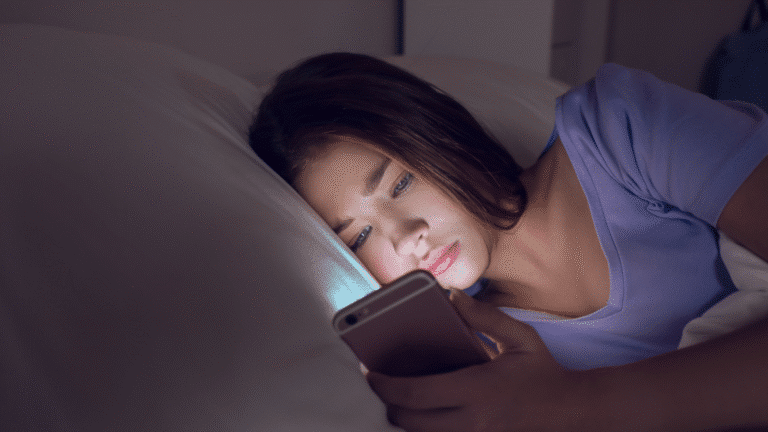We’ve all been there – it’s 3am and you’re wide awake. You’ve been trying to sleep for hours but your brain keeps replaying that tricky conversation you need to have with a colleague tomorrow or the disagreement you had with your partner over dinner. Before you know it, your thoughts are spiralling out of control and sleep seems impossible.
These experiences are common, but for people experiencing acute or chronic stress the sleepless nights accumulate, leading to even more stress. This creates a vicious cycle of sleepless nights and daytime fatigue, which further exacerbates stress levels.
Common Symptoms of Stressful Sleep
When we’re stressed levels of cortisol, adenosine and adrenaline increase. These hormones are all associated with anxiety, alertness and the sleep-wake cycle. As these stress hormones course through your body, the emotional regulation centres in your brain take over, reducing the control of decision-making regions. Your emotions become heightened, putting your brain and body into ‘safety mode’.
Stress affects us all differently but some common symptoms include:
- Elevated heart rate
- Faster breathing
- Tense muscles
- Racing thoughts
- Rumination (getting stuck on negative thoughts and feelings)
- Catastrophising (excessive worry)
Why Stress Affects Your Sleep
Stress in itself isn’t always a problem. In fact, it can be helpful. When we encounter a stressful situation our brains and bodies become more alert, readying us for action – this response evolved to keep us safe. This was helpful when we were hunter gatherers and needed to be on the lookout for predators. However, in modern life, experiencing extreme or chronic stress can cause our bodies to stay on high alert, becoming our default state. This constant state of alertness can severely impact sleep quality.
When Stress Takes Over
When we experience a stressful situation we have a stress response. For most of us most of the time we manage the situation and our stress response subsides. However, if the stressful situation is extreme or ongoing,this response can become maladaptive. We might start feeling stressed in non-stressful situations.
The more we experience this, the more likely our brain is to default to stress mode, even in everyday scenarios. Our stress pathway becomes a familiar and well worn route for our brains. So if you felt stressed out last time you were buying coffee in your favourite cafe, you’re more likely to get stressed out next time you’re in that same environment doing that same activity. At this point we are no longer responding to something stressful in our environment but are reacting automatically.
Unfortunately poor sleepers are more likely to struggle with anxiety, and anxious people are more likely to be poor sleepers. Here’s why.
How Stress Leads to Poor Sleep
If you’re stressed, falling asleep can be challenging. Our stress response often kicks in at bedtime because the distractions of the day are gone, leaving us with our thoughts. We might go to bed ‘tired but wired’, and before we know it we’re lying in bed ruminating and catastrophising, convinced we’ll never sleep again.
Once that stress response kicks in, getting to sleep can be really tricky. Your brain and body are doing everything they can to keep you alert – after all, you wouldn’t want to be falling asleep if there was a tiger prowling nearby! When we’re already tired and stressed we also have fewer resources for sticking to our planned bedtime, making us more likely to stay up late doom scrolling or watching Netflix.
Poor sleep then leaves us less capable of handling stress the following day, leading to more stress when we’re trying to fall asleep the next night. This cycle can be tough to break out of. We start to associate bed and sleep with stress, so that our brains and bodies start to expect stress and sleeplessness whenever we get into bed.
How Poor Sleep Leads to More Stress
Even after just one night of poor sleep you are more likely to:
- Experience more negative feelings like anger and frustration (heightened negative reactivity)
- Focus more on the negatives (negative attentional bias)
- Respond in more extreme ways to stressful situations (emotional regulation)
- Overreact to stress (exaggerated stress response)
- Underestimate how much sleep we’ve had, feeling more tired than you actually are
- Be more sensitive to the negative effects of sleep deprivation
Why does this happen? Neuroimaging studies show that, like stress, sleep deprivation amplifies activity in the amygdala, reducing cognitive control. This leaves us at the mercy of the emotional parts of our brain.
Research tells us that people with irregular sleep timings or reduced Slow Wave Sleep are more prone to anxiety. Therefore it’s not just about how much you get, but also when you sleep, and the quality of that sleep.
How to Disrupt the Cycle of Stress and Sleeplessness
The good news is that just as our brains get stuck in negative cycles, we can also create positive cycles. Humans are naturally wired to focus on the negative, and our brains tend to default to pathways. Shifting from familiar negative to new positive pathways requires effort and practice, but with time these new pathways can become your default.
Effective Strategies to Improve Sleep and Manage Stress
Before you start, it’s important to consider any external stressors that are contributing to your sleep issues and anxiety. While you can benefit from the strategies below, addressing the root causes of stress in your life is also important. Additionally, ensure you’re following good sleep hygiene practices, such as maintaining a regular sleep schedule, exercising regularly, and getting morning daylight exposure.
The goal is to convince your brain and body that there’s nothing to fear. This is achieved by creating new patterns of thinking and behaviour when experiencing stress, and by managing the physiological and psychological stress response through relaxation. Every time you practise these skills, these new pathways become stronger.
- Find a Relaxation Technique: Choose something that works for you, like breathing exercises, meditation, body scanning, reading or stretching. Practise throughout the day, before bed, and when stressed to help regulate your emotions throughout the day and night.
- Control Your Worry: Set aside a specific time for worrying, known as ‘constructive worry time’. Make a list of your worries and categorise them into ‘can control’ and ‘can’t control’.
- Disrupt Negative Thoughts: Take back cognitive control at bedtime by interrupting thoughts that increase your stress. Repeat a simple word or phrase every few seconds until you fall asleep, or try simple sums or word puzzles in your head.
- Get Meta: Remind yourself that “this too shall pass”. Take a mental step back from the situation and recognise that this is just a moment in time.
- Challenge Automatic Thoughts: Ask yourself if it’s truly possible that you’ll never sleep again or be completely useless at work tomorrow.
- Avoid Worrying in Bed: Spending time worrying in bed strengthens the mental connection between bed and anxiety, so that when you get into bed you start to expect to experience anxiety. Break this association by getting out of bed and doing something relaxing and enjoyable. Don’t worry about lack of sleep. You weren’t sleeping anyway. The goal is to reduce worry, which in turn will lead to sleep.
- Focus on Positive Sleep Experiences: Avoid giving airtime to sleep anxiety. Instead, focus on times you slept well and were not anxious.
- Stop Trying to Sleep: The more you try to sleep, the less likely you are to fall sleep. Aim to relax instead, and sleep will come once you master this.
Conclusion
Sleep and stress are deeply interconnected, creating a cycle that can be challenging to break. However, by understanding how stress affects your sleep and implementing strategies to manage both, you can begin to regain control over your nights and improve your overall well-being. Remember, you don’t have to navigate this journey alone. Seeking professional support, such as Cognitive Behavioural Therapy for Insomnia (CBTi), can be an effective way to address persistent sleep issues. Prioritise your sleep, manage your stress, and take proactive steps towards healthier sleep patterns. Better sleep is within your reach!




